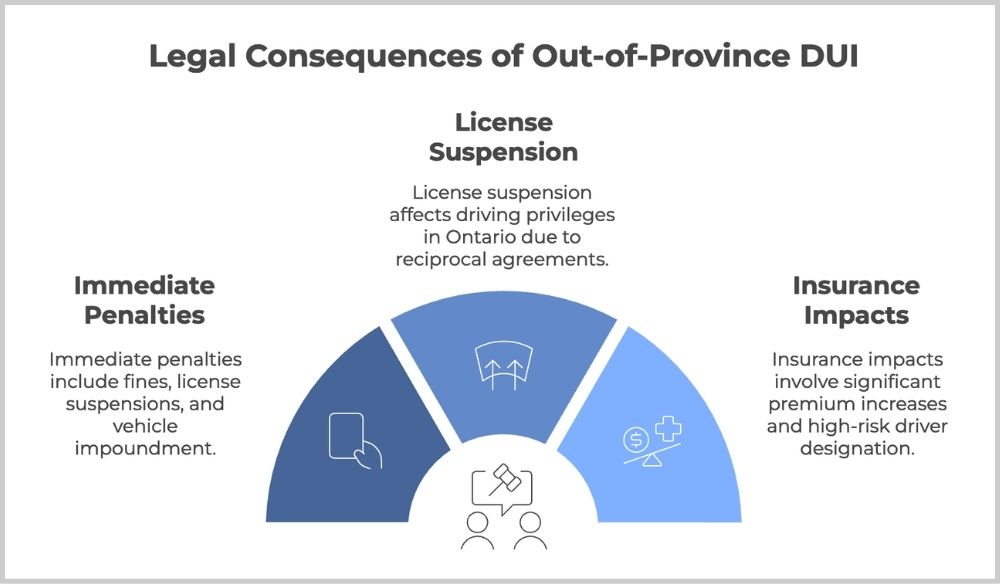Out Of Province DUI for Ontario Drivers
Last Updated: November 6, 2024
For Ontario drivers, the consequences of a DUI (Driving Under the Influence) charge don’t stop at provincial borders.
An “Out of Province DUI” refers to a situation where an Ontario-licensed driver is charged with impaired driving in another province, territory, or even in the United States.
This scenario introduces a layer of complexity to an already serious legal matter, as drivers must navigate not only the immediate consequences in the jurisdiction where the offence occurred but also the repercussions that follow them back to Ontario.
Ontario’s Ministry of Transportation has agreements with other provinces and U.S. states to share information about driving offences, including DUIs.
This means that a DUI conviction in another jurisdiction can affect your Ontario driver’s license and driving record as if the offence had occurred within the province.
Interprovincial DUI laws and enforcement in Canada are governed by a combination of federal and provincial legislation. At the federal level, the Criminal Code of Canada sets out the basic offences and penalties for impaired driving, which apply consistently across all provinces and territories. However, each province also has its own highway traffic acts and related legislation that can add additional penalties or requirements.
In the following sections, we’ll delve deeper into the specific legal consequences of out-of-province DUIs for Ontario drivers, the legal processes involved, and strategies for addressing these charges

How DUI Charges Are Handled Across Provinces
The handling of DUI charges across Canadian provinces involves a complex system of interprovincial cooperation and information sharing. At the core of this system is the Canadian Driver Licence Compact, an agreement among provinces and territories to share driver records.
This compact ensures that driving offences, including DUIs, follow individuals regardless of where they were committed within Canada. When a driver is convicted of a DUI in one province, this information is shared with other provinces, particularly the driver’s home province.
For those relocating to a new province, DUI convictions and their associated penalties typically transfer with them. This means that if you move from Ontario to Alberta with a recent DUI conviction, Alberta will recognize this conviction and may impose its own set of penalties or restrictions based on its provincial laws.
The implications of this system are significant. It ensures that drivers cannot escape the consequences of a DUI by simply crossing provincial borders. It also means that the impact of a DUI conviction can be far-reaching, affecting not just immediate driving privileges but also long-term insurance rates, employment opportunities, and even the ability to travel internationally.
This interprovincial approach to handling DUI charges underscores the seriousness with which impaired driving is treated across Canada and highlights the importance of understanding the potential consequences of a DUI, regardless of where in the country it occurs.
Legal Consequences of an Out of Province DUI in Ontario
The legal consequences of an out-of-province DUI for Ontario drivers can be severe and far-reaching, often mirroring or even exceeding the penalties for a DUI committed within Ontario itself. Understanding these consequences is crucial for any Ontario driver who travels outside the province.

Immediate Penalties:
When an Ontario driver is charged with a DUI in another province, they face immediate penalties in that jurisdiction. These typically include substantial fines, which can vary by province but are often in the range of $1,000 to $4,000 for a first offence. Many provinces also impose immediate roadside license suspensions, which can last for 90 days or more.
Additionally, vehicle impoundment is a common penalty, with some provinces seizing the vehicle for up to 30 days, even for a first offence. These immediate penalties are enforced in the province where the offence occurred, regardless of the driver’s home province.
License Suspension:
The impact of an out-of-province DUI on an Ontario driver’s license is significant due to interprovincial agreements. Ontario has reciprocal arrangements with other provinces and U.S. states to recognize and enforce license suspensions. This means that if your license is suspended in another province due to a DUI, Ontario will likely impose a corresponding suspension.
The duration of the suspension in Ontario may match or exceed the suspension imposed in the province where the offence occurred. To reinstate your Ontario license, you may need to complete not only Ontario’s requirements but also satisfy any conditions set by the province where the DUI occurred, which can include mandatory education programs or the installation of an ignition interlock device.
Insurance Impacts:
An out-of-province DUI can have severe and long-lasting effects on your insurance in Ontario. Insurance companies in Ontario will likely significantly increase your premiums upon learning of an out-of-province DUI conviction.
These increases can last for several years and can be substantial, with some drivers reporting premium increases of 100% or more. Furthermore, you may be designated as a high-risk driver, which can make it difficult to obtain insurance from standard providers. This often results in the need to seek coverage from specialty insurers at much higher rates.
The insurance implications of an out-of-province DUI can be a significant financial burden for years after the conviction.
It’s important to note that a DUI conviction in any Canadian province can also result in a criminal record, which can affect employment opportunities and international travel. Ontario may also require the installation of an ignition interlock device, even if the offence occurred in another province.
Additionally, you may be required to complete Ontario’s remedial measures program in addition to any programs mandated by the province where the offence occurred.

What Happens If You Get a DUI While Visiting Another Province?
When an Ontario driver is charged with a DUI while visiting another province, they immediately become subject to that province’s impaired driving laws and procedures.
The steps taken by law enforcement typically include administering breathalyzer tests, potentially conducting field sobriety tests, and, if impairment is suspected, arresting the driver. The visiting driver will likely face immediate penalties such as license suspension and vehicle impoundment, as per the host province’s regulations.
Crucially, the driver will be obligated to appear in court in the province where the offense occurred, which can present significant logistical and financial challenges for out-of-province visitors.
These court appearances cannot be ignored, as failing to comply with out-of-province legal proceedings can result in serious consequences, including additional charges for failure to appear, warrants for arrest, and further license suspensions that will be recognized across Canada.
Some provinces may allow for alternative arrangements, such as appointing a lawyer to appear on the driver’s behalf or requesting to transfer the case to the home province, but these options vary by jurisdiction and are not guaranteed.
Cross-Border Impact with the United States
An out-of-province DUI conviction can have significant implications for travel to the United States, regardless of which Canadian province the offense occurred in. The U.S. considers impaired driving a serious offense, and a DUI conviction can render an individual inadmissible to enter the country.
This is because U.S. immigration law treats DUI as a crime involving moral turpitude in many cases. Information sharing between Canadian provinces and U.S. authorities is extensive and efficient, facilitated by agreements such as the Canada-U.S. Smart Border Declaration.
This means that a DUI conviction in any Canadian province is likely to be accessible to U.S. border officials when you attempt to enter the country. The U.S. Customs and Border Protection (CBP) has access to the Canadian Police Information Centre (CPIC) database, which contains records of criminal convictions from all Canadian provinces. As a result, even if your DUI occurred in a province far from the U.S. border, it can still impact your ability to travel to the United States.
Travelers with a DUI conviction may be denied entry at the border or may need to apply for a U.S. entry waiver, a process that can be time-consuming and costly. It’s important to note that this cross-border impact applies not only to land border crossings but also to air travel, as airlines are required to share passenger information with U.S. authorities before flights depart.
Therefore, an out-of-province DUI can have far-reaching consequences beyond Canadian borders, potentially limiting international travel opportunities for years after the conviction.
Handling an Out of Province DUI Charge
When facing cross-border DUI laws in Canada, one of the first crucial decisions is whether to hire a local lawyer in the province where the offense occurred or a lawyer from your home province.
Hiring a local DUI lawyer often offers advantages such as familiarity with local courts, judges, and prosecutors, as well as in-depth knowledge of the specific provincial laws and procedures. However, a lawyer from your home province might better understand how the charge will impact your driving privileges and insurance back home.
In some cases, a combination of both might be beneficial. Navigating court appearances remotely has become more feasible in recent years, especially post-pandemic, with many courts offering virtual attendance options. However, some jurisdictions may still require in-person appearances, particularly for trials or guilty pleas.
It’s essential to clarify these requirements early in the process and explore options for remote participation or representation by your lawyer.
To resolve license suspension and penalties, you’ll need to address requirements in both the province where the offense occurred and your home province. This typically involves completing any mandated programs (such as alcohol education or treatment), paying fines, and potentially installing an ignition interlock device.
It’s crucial to obtain clear documentation of compliance from the charging province to facilitate reinstatement of your license in your home province.
Final Thoughts
Out-of-province DUI charges present significant challenges for Ontario drivers, with consequences that extend far beyond the immediate incident. Key takeaways include the extensive interprovincial information sharing that ensures DUI convictions follow drivers across Canada, affecting driving privileges and insurance rates in their home province.
The immediate penalties imposed in the province of offense can be severe, often mirrored by reciprocal actions in Ontario. Furthermore, these charges can significantly impact cross-border travel to the United States due to efficient information sharing between Canadian and U.S. authorities.
The importance of consulting legal counsel in navigating how out-of-province DUIs affect driving records cannot be overstated. An experienced lawyer can provide crucial guidance on the specific laws and procedures of the charging province, advise on strategies to minimize impacts on Ontario driving privileges and insurance rates, and assist in coordinating compliance with legal requirements across multiple jurisdictions.
Legal experience is invaluable in navigating court appearances, whether in-person or remote, and in addressing potential impacts on international travel and employment.
Get A Free Consultation
"*" indicates required fields



